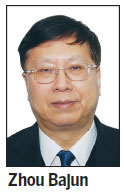Economic growth depends on social, political stability
Updated: 2014-05-28 05:51
By Zhou Bajun(HK Edition)
|
|||||||
Recent statistics released in Hong Kong indicate the city's economic growth has been losing momentum. Its GDP expanded only by 0.2 percent in the first quarter of 2014 over the previous quarter - the slowest expansion in two years. This was mainly because of a fall in exports and an easing in private consumption. During the first quarter of the year, compared with the preceding quarter, exports of goods fell by 3.4 percent while exports of services rose slightly by 0.2 percent. Meanwhile, private consumption rose a seasonally adjusted 1.1 percent, falling from a 1.8 percent increase in the last quarter of 2013.
Hong Kong's competitiveness has been declining both nationally and globally. On May 9, the Chinese Academy of Social Sciences released a report about the competitiveness of China's major cities. Although Hong Kong topped the chart for the 12th consecutive year, the runner-up is now less behind than during the previous year. Zhuhai has, for the first time, replaced Hong Kong as the most livable city in China. The academy reminded Hong Kong that it should resolve some of its structural problems as well as seizing every opportunity to cooperate more with the mainland.
Two weeks later, on May 22, the IMD, a top-ranked global business school based in Switzerland, released its 26th annual World Competitiveness Rankings. Hong Kong, having slipped from the top spot in 2012, further dropped from third in 2013 to fourth in 2014. Now it is behind Singapore, which rose from fifth in 2013 to third this year.
An alarm bell is ringing all over Hong Kong. Leading commentators, as well as government officials, have had open discussions to find out what is wrong with the economy.

According to the IMD's analysis, Hong Kong fell behind Singapore in two main areas - economic performance and infrastructure. Nevertheless, the Hong Kong government since 2007 has committed huge amounts of resources to the construction of 10 major infrastructure projects. The government has also admitted the city should upgrade itself from a service-based economy into a knowledge-based one. Why then is Hong Kong still losing its competitive edge?
From a business point of view, Hong Kong's decline is to some extent due to high rents. Thankfully, the SAR government has done its best to cool the property market.
But the city's most serious problem is politics. As I have noted in this column several times, local opposition groups have been obstructing Hong Kong's economic and social development to serve the interests of their foreign masters.
On May 22, the day the IMD released its 2014 competitiveness report, a few radical opposition lawmakers put on a disgusting show of political hooliganism. They repeatedly interrupted Chief Executive (CE) Leung Chun-ying's speech during a Q&A session of the Legislative Council (LegCo). What was even worse was this set a new record in LegCo's history. It forced the LegCo president to end the Q&A session with the CE barely half way through it. This is a very worrying development: The relationship between the executive and legislative branches of the government is now near breaking point. If loopholes in existing legislative procedures are not fixed soon, the executive branch may find it impossible to implement policies. Immediately after this appalling incident, the State Council's Hong Kong and Macao Affairs Office and its Director Wang Guangya condemned this obnoxious behavior. This was the first time in the SAR's history that central government authorities have to do this.
The ultra-radical elements in the opposition camp are not only impeding government operations with filibusters in LegCo, they are also planning to use the illegal "Occupy Central" campaign to force the central government's hand in a potentially calamitous gamble. This could hurt Hong Kong's economy badly as well as derailing its planned constitutional reforms. Some people hope the "moderate pan-democracy parties" will stand clear of the radical hard-liners and work to build consensus with the majority of people on constitutional reform. Such reform has to be fully compatible with the Basic Law and relevant decisions by the National People's Congress Standing Committee (NPCSC) if Hong Kong is to have a CE election by universal suffrage in 2017.
Former chief secretary Anson Chan was for a while considered by some as a leader of the "moderate pan-democrats". Unfortunately, the rosy halo many saw above her head has been replaced by a dark cloud. This happened when she took her "moderate" mask off during the third "Deliberation Day" (D-Day 3) organized by "Occupy Central" campaign organizers.
The central government has advised Hong Kong residents that the "Occupy Central" movement wants not only to violate the rule of law but also ruin Hong Kong's economy. Only by resolving its political problems, Hong Kong can regain its competitiveness and rise to the top again.
The author is a veteran current affairs commentator.
(HK Edition 05/28/2014 page9)